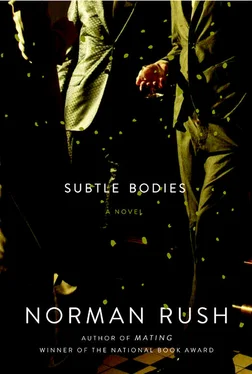He felt like lifting the blanket enough to take a look at Gruen. Or rather, he didn’t feel like doing that, he felt like not having to wait for everything to happen. How could it be that they hadn’t connected physically in twenty years? At around five six, Gruen was the shortest of the friends. And although the hurtful phrase Small but Perfectly Formed hadn’t been around in the seventies, if it had been it would have applied to Gruen, then, with his fine Nordic head, his profile cut to go on a coin or medal.
Glancing around, Ned decided that sleeping there would be fine, if it couldn’t be avoided. Views left and right — calm prospects, no crags, just the matte grandeur of tracts of trees sweeping up to plucked-looking ridgelines, marred, if that was the word, here and there by isolate slumping-limbed firs resembling incorrect ideograms. Scenery is probably good for your blood pressure, he thought. Set into the wall back of the stairhead was a sort of booth whose door was ajar. It was a half-bath, rosily lit. So there was everything.
A pair of lustrous black cowboy boots stood at the foot of Gruen’s cot. He wore boots for the obvious reason, and in fact Ned had been the one to encourage him not to be embarrassed about making the transition from regular shoes if it made him more comfortable, which it had.
The bare cot with the block of folded bedclothes on it was going to be his. He was next to Joris, whose cot was neatly made up. Joris had always been tidy, which reminded Ned of an incident: their group in the village, strolling down Mercer Street, Douglas saluting some sanitation men at work there and calling out the phrase NEW YORK’S TIDIEST, which the men hadn’t liked, and had resulted in filth of some kind finding its way onto Douglas’s new shoes. Ned wouldn’t mind discussing the subject of just how funny most of their japes had been.
Lined up across Joris’s pillow were a shaving kit, a cordless LED reading light, and a new hardcover copy of The Twilight of American Culture , by Morris Berman. It was a luxury, buying books new, but somebody had to do it, and if Joris could afford it, good for him.
Ned stowed his things under the cot meant for him. He wanted Joris to appear, and Gruen to wake the fuck up. Elliot was talking furtively on his cell phone, again. He wanted to go up to the next level, to Douglas’s study. He wanted to see Douglas’s sanctum. He didn’t need permission. This sleeping room was uninteresting. It was storage. Around the periphery were tables loaded with books and periodicals. There were more books piled under tables. There was another vast oriental rug underfoot. He mounted to the next level while Elliot continued in conversation.
Ned was in distress. It was all right because it was going to go away. He was sitting in Douglas’s desk chair, a heavy throne-like baronial thing that could roll smoothly to any point along the wooden desk ledge that encircled the room, except for two interruptions, one for a fireplace and one for the circular iron stairway to the tower roof, where Ned wanted to go next. He might feel better up there, if only because it would get him out of this ultimate venue for a person to think and work in, ever. Douglas’s study was not only esthetically elevating, it was consummately equipped, the essential tools distributed intelligently around the scene. He was seated in front of the computer-scanner-printer complex, next to the phone-fax setup, and a short slide away from an imposing stereo layout. There was an intercom microphone at hand and next to it the speaker that went with it. The lighting was mostly green-shaded bankers’ lamps, with a few tensors included for variety. Where Douglas had found a completely round Persian rug was a question. Ned’s feet encountered a couple of ten-pound dumbbells under the desk. Douglas had once announced his intention to die thin as a curate. They had all been thin, then, Gruen less so. There were no photographs of Douglas on display. In fact the only images in the little selection on the wall to the right of the desk were of Douglas’s boy Hume. They were all early childhood pictures.
Everything was a fount of sadness. This perfect workplace sitting empty, abandoned by the one it was perfect for, abandoned abruptly years too soon. There was only one photograph that wasn’t of Hume as a small child. The disparate one was a framed tear-out from an ancient tabloid showing Sophia Loren shooting a disconcerted sidelong glance at her dinner partner Jayne Mansfield’s cleavage. That was Douglas. Ned didn’t like it that Iva wasn’t represented, nor anyone other than Hume who was related to him in any way. The friends had been a presentable group, overall. Douglas had taken the position that his success with women at NYU was a mystery to him. Nina, studying one of the few photos Ned possessed from their college days, had suggested that Douglas’s success had been attributable to a brooding manner and his permanent five o’clock shadow, the political prisoner look.
Ned heard his name being spoken below. He wanted to get out on the tower roof before he went downstairs.
He knew he was looking at something salient but not seeing it. At the center of the miscellany of books lining the back edge of the section of desk right in front of him was Douglas’s Oxford UP paperback copy of Boswell’s Life of Samuel Johnson . Douglas had been an absolute Johnsonomane. And in a fax communication years ago, he’d claimed that he’d gotten so much pleasure out of reading The Life that he’d stopped and placed a bookmark at page 847 so that he would have finishing the book in pleasant increments to look forward to. And here it was. Ned pulled the book from the shelf. It was bookmarked at page 847. He slipped the book into his rucksack. Douglas had related powerfully to Samuel Johnson somehow. All the friends had been hectored to read the damned thing. It was great, of course.
The stereo’s power light was on. Impulsively, he pressed the open/close button and removed the CD the tray delivered. This would have been one of the last things Douglas had listened to. It was Vivaldi’s Concerto for Guitar in D Major played by the Wiener Soloisten. He found the jewel case, put the CD away in it, and slid the case into his pocket.
Out on the roof, the wind was raw and lurching. Dark was coming fast. There was a ludicrous parapet around the roof with embrasures useful only for archers who were toddlers. The pebbled surface of the roof was convex, for drainage. Ned didn’t want to pitch over the side. He concentrated on his footing. A telescope on a tripod was wrapped in black plastic sheeting bound tightly with long twist ties. Probably he should take it inside. Out of the way, a child’s wooden chair lay on its side, bleached, coming apart, obviously abandoned years ago.
Gruen was calling to him.
“Don’t come up,” Ned said. “There’s nothing here.”
• • •
Gruen looked lost standing beside his cot, wrapped in blankets, using a bath towel for a hood. He had a cold, he was saying, with difficulty. He shook a Kleenex at Ned as a warning sign of his condition.
“I don’t care,” Ned said, and embraced him. Both of them wept briefly. Elliot had gone into hiding in the main house. Joris was still wherever he was.
It was maudlin, for a time. Ned let himself go. Gruen had a sore throat and kept saying he had to stop talking. But they went on. Gruen pulled his towel down for use as a scarf. Ned could see his face clearly then. His hair was thinner, and was auburn, to Ned’s surprise. Gruen had gained weight. His face was still youthful, though, somehow. Gruen owned an agency dedicated to creating public service announcements for television. He was under the impression that Ned was still living with Claire, Douglas’s Claire of the old days. Ned had to explain that he and Claire hadn’t been together for five years, and that he would tell the whole long story when Joris got there. He didn’t want to have to repeat it. He was married to Nina and he had never been married to Claire. He underlined that. Both men expressed guilt for not staying in better touch with one another, and with Douglas. In different ways, they were repeating disbelievingly that the founder of their group, their friendship, was suddenly dead, and here they were, camped out in the pretty stupefying domain he had left behind. Gruen had no children. He wondered if Claire had been informed about Douglas’s death and Ned said she would see it in the papers, probably already had. He wanted to shake the shadow of Claire off them, away. They wondered together what was going to happen to Iva now. Gruen said that Douglas’s son, according to his latest understanding, lived in the woods, strangely enough. There was going to be a ceremony. And press was coming, was already coming, and Elliot was in charge, giving orders. Gruen said that Douglas had been more famous in Europe than they had known.
Читать дальше











